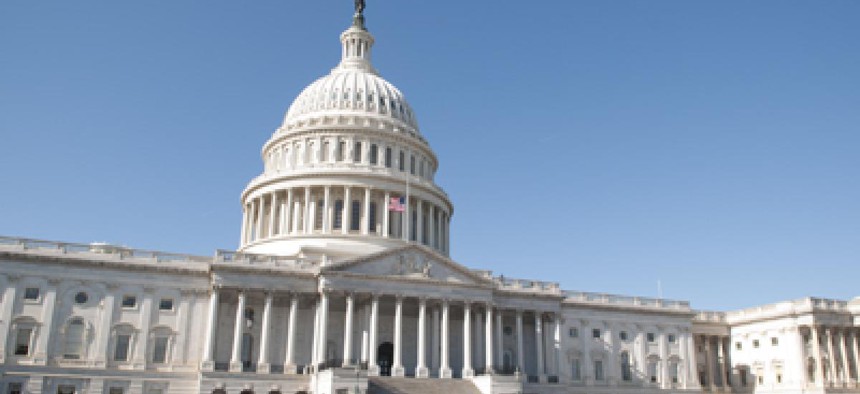
Liz Lynch/National Journal
House keeps government open through Nov. 18; what happens next?
Lawmakers now must figure out how to fund the government for the rest of fiscal 2012.
In bipartisan fashion, the House on Tuesday gave final passage to a measure that will keep government running for another six weeks and avert what, theoretically, could have been a midnight shutdown.
But partisan storm clouds already are gathering on what happens next, as lawmakers now seek resolution on how to fund the government for the rest of fiscal 2012.
The new federal fiscal year actually began last Friday, and is already several days old. But none of the 12 annual appropriations bills are finished. In fact, the Republican-led House has passed its versions of only six of the bills, and the Democratic-controlled Senate has passed just one.
Tuesday's short-term "continuing resolution" to keep government funded through Nov. 18 was the product of another 11th-hour deal worked out by House and Senate leaders, and includes $2.5 billion in disaster funding, and none of the disputed offsets. The Senate passed it last week.
It now gives Congress and President Obama - who this summer agreed to a $1.043 trillion spending cap for the parts of the federal budget that lawmakers must approve each year - more time to work out details of how specific programs and departments will be funded for the remainder of the fiscal year.
And there already are strong disagreements emerging between the parties.
House Speaker John Boehner, R-Ohio, and other House Republican leaders are wrestling with the unpredictable bloc of about 50 tea party members in their ranks, many who want to slash more federal spending than was agreed upon this summer. That could force House Republicans to negotiate with Democrats to muster enough votes to pass future appropriations measures.
House Majority Leader Eric Cantor, R-Va., has said he hopes there will be no more temporary spending bills beyond Nov. 18. And some rank-and-file Republicans are more emphatic - they've told their leaders they will not go along with another continuing resolution.
House Minority Whip Steny Hoyer, D-Md., said on Tuesday that the way forward will likely be some type of omnibus spending bill -- a grouping of appropriations bills into one measure to cover the remainder of the fiscal year -- or perhaps several smaller "minibus" bills.
But he said for that process to work, there still must be agreement between the Senate and the House on budget allocations per individual committees and other details.
Boehner said on Tuesday, "In terms of funding levels, we'll be working all of these out with our colleagues in the Senate, and I'm confident we'll come to an agreement."
NEXT STORY: Energy's Separate Wavelength







